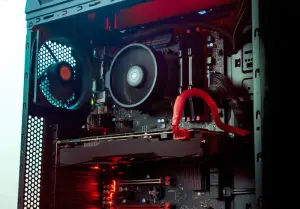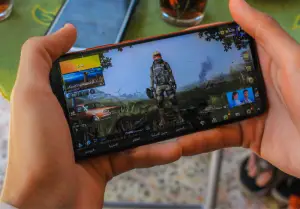15 Interesting Video Game Designer Facts
1. There Are Several Different Types of Game Designers
While there isn’t much variation in degrees, usually designers will specialize in one area or another as they learn what they enjoy more and what they are best at. Some may prefer to work only on first-person shooter games, while others may prefer games of the role-playing variety.
Some developers are more interested in the fine details and will specialize in landscape or facial feature development, no matter what category of game they are working on.
Still, others specialize in translating games to other languages after they’ve been completed in their first language, or in converting a game made for PC into a game that can be played on a console.
2. The Median Yearly Salary is $90K
According to CareerExplorer.com, most game developers earn $90.3K per year, making it a good choice for a career that will provide a comfortable lifestyle. The lower 20% earn around $47.4K and the top 20% earn $172K.
3. The Job Market Is Expected to Grow
During the decade between 2016 and 2026, CareerExplorer.com predicts that the job market for video game developers will expand by 9.3%.
4. A Bachelor’s Degree Will Help but Isn’t Required
Students interested in becoming video game developers will be more likely to succeed with a bachelor’s degree, though occasionally the self-taught genius is able to make a place for herself in the industry.
The most applicable choices are to either major in video game design, or to major in a related computer area and minor in design. Consider which aspect of video game design is most appealing for you and choose your majors and minors (if needed) appropriately based on what you most want to specialize in.
If you aren’t sure yet about what part you are most interested in, consider starting with a major in video game design and getting experience in different areas through internships and/or trying to develop something on your own. You’ll learn a lot through those experiences and can alter your major and or minor as needed.
5. It Takes 2-5 Years to Develop Fully Functioning Games
Why does it take so long? Because a lot of trial and error is involved in such a huge project. And it takes time to test all the different pieces. Whenever bugs are found, which many will be, they have to be fixed. And sometimes fixing the coding to remove a bug can cause a domino effect and introduce new bugs and other issues into the game that will all have to be resolved without causing any more related problems.
Oftentimes, indie games take even longer to produce, as funding is more difficult to come by and there are usually a lot fewer people on the team.
6. Game Designers Do More than Merely Entertain
Besides inventing interesting storylines, mysterious characters, and gorgeous graphics, video game designers can use their influence to spread their ideas and encourage other people. You can use your stories and characters to encourage people who are going through depression or other medical difficulties, and people struggling with their body image.
Through games featuring characters with the same struggles, people in real life can find new perspectives and stop feeling so alone in their difficulties.
A designer can also draw attention to causes that they are passionate about, such as recycling, preserving nature parks, and taking better care of animals, just to name a few. These things could play a major part in the story or be a small piece in the background. But as the designer, you can choose whether to include things like this and how much to include.
7. Game Developers Dress Casually
If you work in a building with your game development team, you’ll find that the dress code for this crowd is different from the usual professional attire. Jeans and graphic t-shirts or comfy sweatshirts are often the expected style when working in the game development world.
While this doesn’t mean that you should show up in your underwear or straight-up pajamas to work, you can dress more comfortably than you would have the opportunity to in most other jobs.
8. 90% of Games Have the Same “Door Opens” Sound Effect
Most video game developers using game-making tools don’t bother to change the sound effect for doors opening and closing. As a result, the majority of games made have the exact same “door opens” sound.
While there are many resources for getting sound effects for various machine noises, animal calls, and everyday sounds online, developers have been known to go to great lengths to get their own sound effects. Even hang out the window of a car while your buddy drives through muddy fields across from your neighborhood in order to get good sound effects for a car struggling for traction in a rainy jungle setting.
9. PC Games Are Harder to Develop than Console Games 
The difficulty with developing games for a PC is that there is a huge variation in what a PC can handle depending on how much a user has invested.
The difference between a low-tech PC build and a high-tech PC build could mean the difference between whether your game is playable on a given PC or not.
It’s a tedious balance to guess at as you choose the specs your game will require to be playable.
Consoles, on the other hand, are all the same. Of course, there is the difference between a Play Station and an Xbox, and their different generations, but that’s a total of about 5 or so variations, versus the infinite number of variations in a PC build. If you are going to design a game for PS4, it might also be playable on PS3, and other than that, you don’t have to factor in any changes.
If you want to make it also available for Xbox 360 and Xbox One, then there are two more sets of alterations. Still much easier to deal with than the vast variation between PCs.
10. You Don’t Have to Be a Gamer to Develop Games
While people usually think of video game development as a job specifically for those who love to play video games, that is not strictly true. Many avid gamers do become developers, but a love of playing games is not a requirement for building them.
Creatives who are fascinated by computer programming make excellent video game developers, regardless of their own gamer status. Also, digital artists who love creating aesthetically pleasing digital art are necessary for game development to make it pleasant for users to look at.
11. Game Developer Jobs Are All Over the World
People seem to think that Silicon Valley or other California locals are the only places to work as a video game developer. While there is a high concentration of developers in that area, there are many developers living all over the world.
Sometimes developers are able to work primarily from home, preventing the necessity of a move to be nearer to the company. Sometimes companies based in California have other smaller offices located in more rural areas. No matter where in the world you live, there are developer job opportunities available to you.
12. Game Designers Have Good Career Pivot Options 
If you get a lot of education and experience in game development but eventually decide that it’s just not the dream job you thought it would be, there are lots of other uses for your skills.
Consider looking for a job where you can use your graphic design skills to create animations for movies or even commercials. If you’re a computer programmer, consider looking for a job opportunity with app development or even simply creating websites businesses.
13. The First Video Game Was Produced in 1972
In 1958, television engineer Ralph Baer proposed the idea of simple games people could play on their TV screens. This inspired a man named Nolan Bushnell to invent Pong, the very first video game played by two players hitting a ball back and forth to each other like in ping-pong.
This innovation in video game development led to Bushnell’s fame and fortune as he went on to found Atari.
14. The First 3D Video Game was Invented by Yu Suzuki
Suzuki used his hardware engineer background to improve video game system motherboards as well as develop the first-ever 3D graphics. He is known for the creation of such titles as Virtua Racing and Virtua Fighter, as well as the critically acclaimed Shenmue series.
15. Sonic the Hedgehog’s Developer Didn’t Have a Degree
Yuji Naka learned about video game code by reading about it in magazines when he was supposed to be listening or studying in school. Instead of going to college after graduating, he applied for a job at a video game development company. While working there, he programmed the original Sonic the Hedgehog game with a couple of developer friends.
It was a smashing success, and soon after he left that company to found his own, where he still creates games successfully to this day. Without a college degree.

